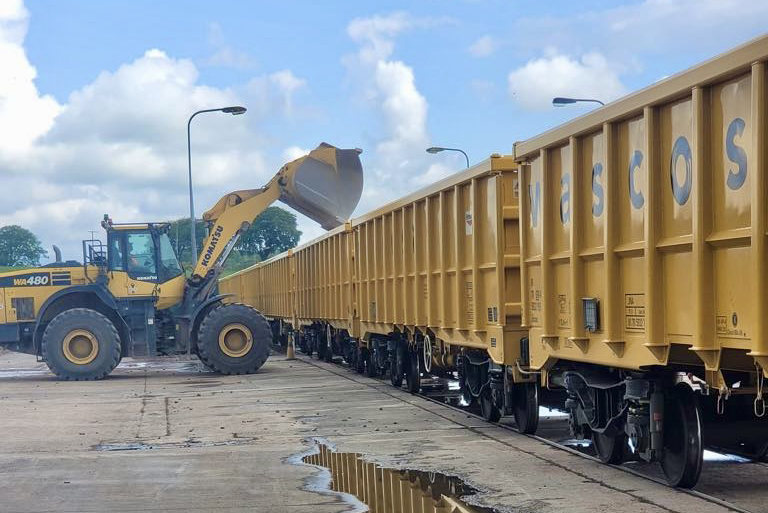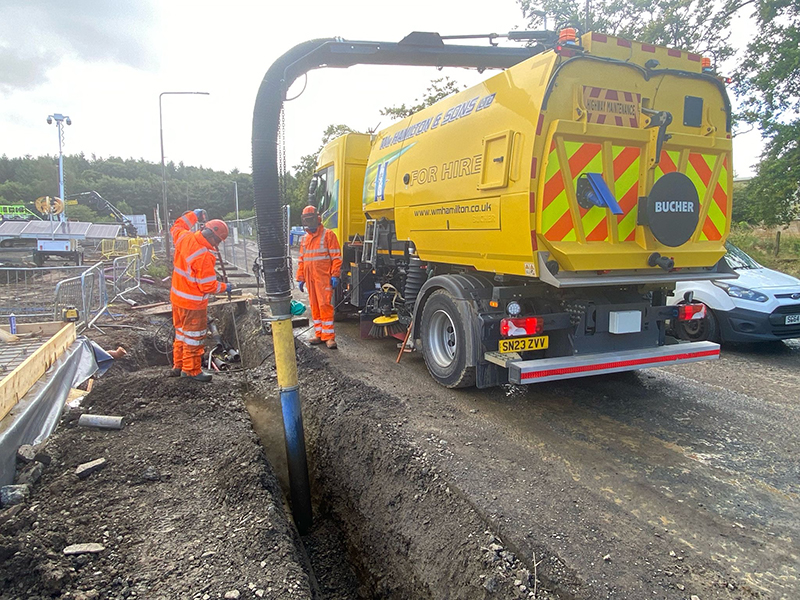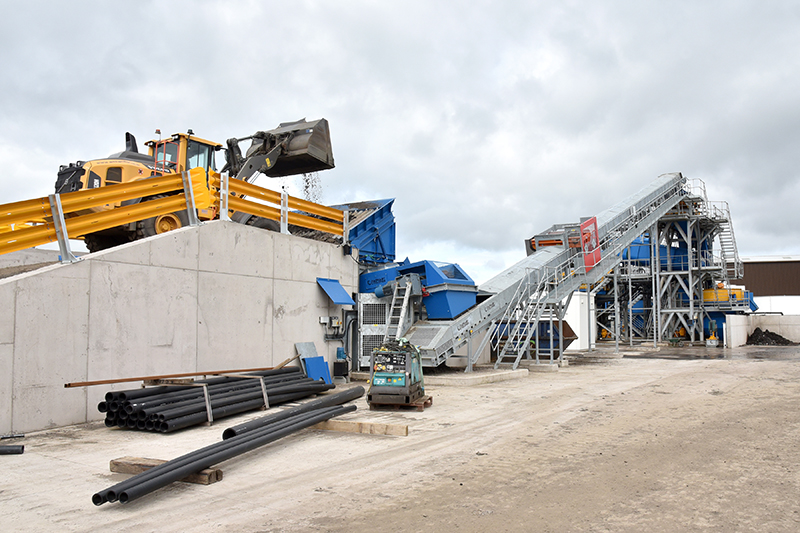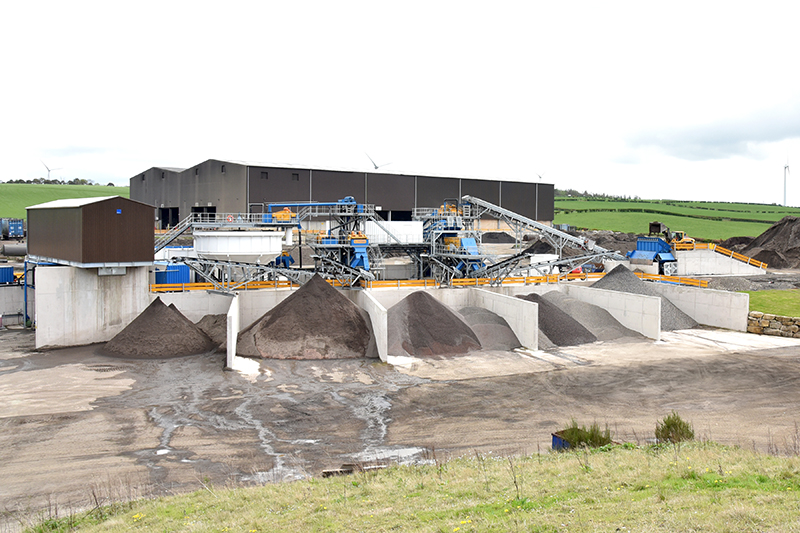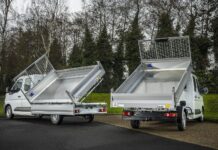
PRIVATELY-owned group Wm Hamilton & Sons is gearing up for further growth after diversifying the company’s offering.
The business, which can trace its roots back to the 1870s, started out as an agricultural contractor, developed into haulage, and has since grown organically and added road sweeping, suction excavation, landfill, industrial services, and recycling of aggregates to its portfolio.
The latest string to the company’s bow is quarrying, following the recent acquisition of Cloburn Quarry, home of the famous Lanark Red aggregates and a supplier of Network Rail-approved rail ballast.
The quarry has been in operation since 1896 and is one of the largest inland quarries in Scotland, producing distinctive and specialist products that are despatched worldwide via road, rail and sea.
The relationship between the two businesses goes back many years, with Cloburn Quarry Company being one of Wm Hamilton’s largest haulage customers. With many existing synergies between the two firms, Wm Hamilton didn’t hesitate when the opportunity arose to buy the organisation earlier this year. The quarry directly employs 30 people, all of whom – including the senior management team – have been retained to ensure a seamless transition and business as usual for customers.
One of the major attractions of Cloburn Quarry Company was the firm’s railhead, which was once a Scottish Coal asset. Cloburn has been operating it since 2022.
Stuart Clingan, MD of Cloburn Quarry Company, explained, “The majority of our Railway Ballast is transported by truck from the quarry to the railhead, some four miles away. From there it gets stocked and subsequently loaded onto rail wagons, where we have direct access to the West Coast Main Line. From this strategic starting point, our products are quickly and efficiently transported throughout the UK rail network.”
The major benefit of the railhead has been a reduction in the quarry’s carbon footprint. Stuart revealed a recent calculation found that the business has saved around two million road miles in the last three years.
Wm Hamilton has no plans to change the day-to-day running of the quarry business. Instead, the focus is on maximising opportunities and building on its existing operations.
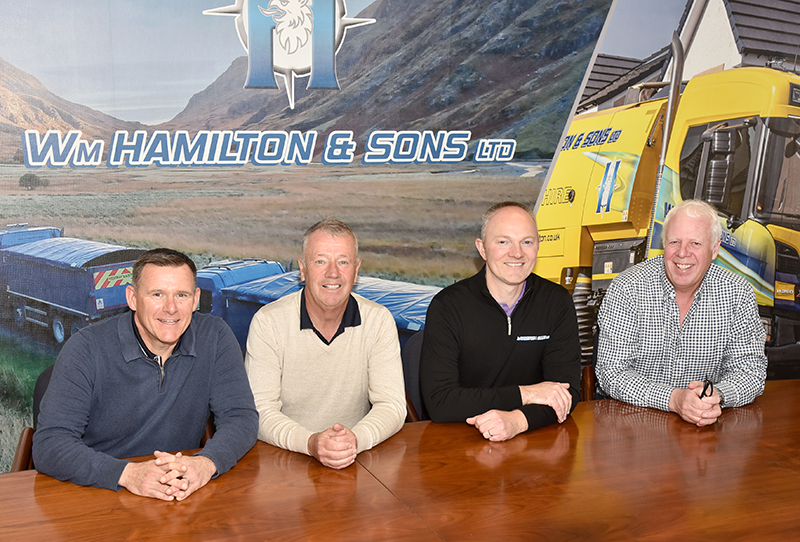
In keeping with the circular economy theme, another area of the Wm Hamilton & Sons business which is currently experiencing increasing popularity is surface water management and gully maintenance.
The effective management of surface water run-off during construction and housebuilding projects has been largely driven by environmental protection and regulatory compliance requirements. Failure to comply can lead to fines, project delays, and reputational damage.
Wm Hamilton supports housebuilders by providing gully maintenance throughout the construction phase across live developments. The service offers documented evidence, with reports supporting Surface Water Management Plans (SWMP) and Pollution Prevention Plans.
Justin Gill, operations director, said, “A big problem on new housing projects and construction sites is what happens to the wastewater and the drainage whilst under construction. The practice over many years was for wastewater and silt to accumulate and be allowed to go into the gully system and end up in SuDS ponds, which then had to be cleaned out and emptied.”
With this practice now deemed to be unacceptable, demand has grown for a proactive approach.
“We provide a service through a hydrovac vehicle where we will go in, clean the system out, and install gully guards, which is a big filter bag that prevents waste silt going down through the drainage network,” Justin added. “On a bi-monthly basis, we go in and clean those gully guards to prevent any materials going into the SuDS ponds. It’s starting to really gain traction.”
Wm Hamilton made a big impact at the firm’s ScotPlant debut last year, where the business showcased a hydrovac suction excavator, which uses suction power and prevents having to put a mechanical digger into the ground and the associated risks of damaging underground utilities.
“The high pressure of the water loosens up the ground material,” Justin added. “Instead of digging, you’re blasting it with water and then lifting it up. That’s been taken up by some local authorities, housebuilders, and the construction industry generally.”
Wm Hamilton also offers a range of industrial services, including tanker operations, drainage cleaning/CCTV inspections, and SuDS dredging.
A key milestone came in 2009 when a waste transfer and storage facility was built at the company’s Dovesdale Farm HQ near Larkhall, expanding Hamilton’s operations into waste transfer and haulage. The storage facility allows for storage of road salt and topsoil.
The business operates two SEPA-licensed disposal facilities: one at Dovesdale Farm and the other in Paisley. Both sites can handle a range of waste streams, including oily waters, interceptor waste, street sweepings, gully waste, and flood waters.
The Dovesdale Farm site features a purpose-built wash plant. The facility produces recycled aggregates and sands, including 10mm, 20mm and 40mm aggregates, as well as 2mm fine and 4mm coarse sands.
Parnaby’s was selected to supply the aggregates washing plant. The plant is a modular design capable of processing up to 80tph of muck away as well as sweepings and gully waste. It boasts unique features of density separation, designed to efficiently remove organics from all product size fractions. The process has a closed-circuit water treatment system with Parnaby high-rate thickener/clarifier and incorporates a Diemme Soils overhead beam filter plate press.
“The products we’re making from the wash plant are incredible,” explained director Raymond Hamilton. “Things are changing in the construction industry. Housebuilders are looking for waste to be recycled. They don’t want inert material to go to tip.
“Since we relocated our head off to Dovesdale Farm in the mid 1990’s we’ve been crushing and dry screening materials. The difference now, with the wash plant, is that we can provide a range of clean sized products that are in high demand within the construction sector.”
Despite expanding its operations, Wm Hamilton remains as committed as ever to providing its core services which the business is known for. The sweeper fleet comprises 30 modern Bucher road sweepers, while on the hauler side, tipping trailers, walking floors, powder tankers and curtainside trailers are available.
With around 130 employees, the firm is an important local employer and is currently doing its bit to alleviate industry skills shortages, including supporting drivers through their Class 1 licence.
This ties in with Wm Hamilton & Sons’ long-held principle of investing heavily in its workforce. The company prides itself on having a small turnover of staff and providing clear pathways to career progression.
Looking to the future, standing out in a competitive marketplace through delivering high quality service remains the key focus – a mantra that has helped the business thrive for over 125 years.




